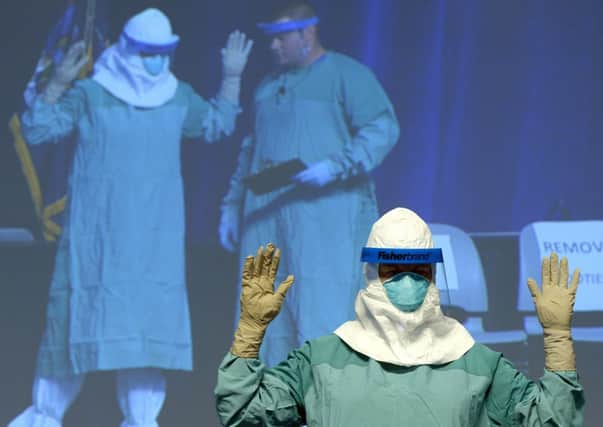Scots GP set to join Ebola fight in Sierra Leone


Dr Chris Mair, who is volunteering for the first time, travelled to the country’s capital, Freetown, where he will be based for six weeks along with NHS colleagues from across the UK while tending to victims of the disease.
The 60-year-old has just finished a week of intensive training along with around 50 other volunteers at a specialist Ministry of Defence unit in Catterick Garrison, North Yorkshire. The team worked in a replica medical camp where the armed forces put them through their paces in the different stages of assessment and treatment of suspected and confirmed cases.
Advertisement
Hide AdAdvertisement
Hide AdFather-of-three Dr Mair, a GP at the Creich Surgery in Bonar Bridge, Sutherland, is expected to be the medical lead for a team of between six to eight doctors, nurses and paramedics at the 92-bed Kerry Town Ebola treatment centre.
As well as providing care for infected healthcare workers and those who have contracted Ebola, the centre also has a blood testing laboratory.
He said: “For a long time I thought of doing something for humanitarian aid but it’s difficult when your children are small. But my youngest is now 14 and I can have a sensible discussion about my reasons for volunteering and all the family told me to ‘go for it’.”
CONNECT WITH THE SCOTSMAN
• Subscribe to our daily newsletter (requires registration) and get the latest news, sport and business headlines delivered to your inbox every morning
He added: “It’s a major incident and I expect it to be a lot worse when we get there.”
Dr Mair said he was “really looking forward to going” and described the rigorous training volunteeers have had to go through.
He said: “You start off learning how to put on your protective equipment and that’s really quite complex.
“It can take up to 15 minutes to put your kit on, which you do in a ‘buddy’ system with a partner, then you sign the other person off, so you’re responsible for each other and you actually get quite close to them as you’re taking this very seriously.
Advertisement
Hide AdAdvertisement
Hide Ad“It’s important to get things right, make sure the hood is in the right place, the mask’s in the right place, the apron’s been put on correctly and the gloves have been put on properly.
“But the real problem is when you come to take the protective clothing off, because by that time you’ll have been in your kit for around three hours and you’ll be really hot and sweaty and wanting to get out of your suit, but that’s when you risk becoming contaminated.
“It takes about 20 minutes to take all the equipment off, you are talked through it, so you don’t have to remember it and it’s done on a sequential basis.
“You follow the process step-by-step, it includes hand washes between each stage and every bit of kit you take off is contained then disposed of never to be used again.”
Dr Mair added: “The trainers want to make sure you’ve got good technique and the protective suit is taken off boots first with hand washes in chlorine solution done after each stage, in a prescribed way around seven times in total.
“You’re washing off invisible stuff and only a tiny particle can lead to contamination, so you have to be fastidious in every thing you do, after that everything you’ve been wearing gets thrown out.”
The volunteers are expected to be away for six weeks and are due to return around 28 December. They will stay in a villa at Lakka beach, the setting for the Bounty chocolate bar Taste of Paradise adverts.
In addition to treating patients, the NHS volunteers have been instructed on how to handle the bodies of Ebola victims.“We are taught how to deal with the bodies, when people die they’re at their most infectious, and that’s really were the problem lies, particularly with the washing of bodies in Sierra Leone, which is done for religious purposes,” said Dr Mair.
Advertisement
Hide AdAdvertisement
Hide Ad“However, in a short space of time the army have persuaded people that bodies have to be disposed of immediately in an approved way and that’s now happening in around 90 per cent of cases. “
The World Health Organisation latest figures show 5,420 people have so far died of Ebola across eight countries, out of a total 15,145 cases of infection, since late December 2013.
SCOTSMAN TABLET AND IPHONE APPS